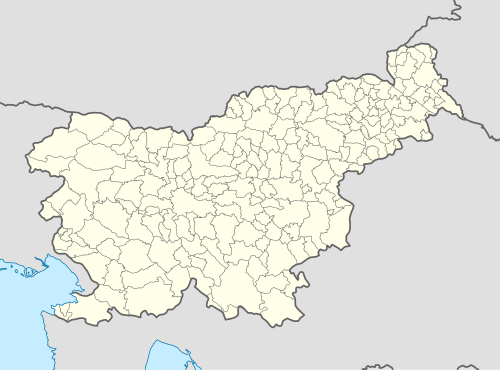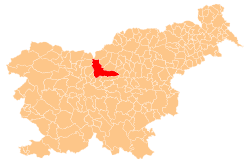Kamniška Bistrica, Kamnik
| Kamniška Bistrica | |
|---|---|
 Kamniška Bistrica Location in Slovenia | |
| Coordinates: 46°19′36.08″N 14°35′26.31″E / 46.3266889°N 14.5906417°ECoordinates: 46°19′36.08″N 14°35′26.31″E / 46.3266889°N 14.5906417°E | |
| Country |
|
| Traditional region | Upper Carniola |
| Statistical region | Central Slovenia |
| Municipality | Kamnik |
| Elevation | 595.8 m (1,954.7 ft) |
| Population (2002) | |
| • Total | 18 |
| [1] | |
Kamniška Bistrica (pronounced [ˈkaːmniʃka ˈbiːstritsa]) is a small dispersed settlement close to the source of the Kamnik Bistrica River in the Municipality of Kamnik in the Upper Carniola region of Slovenia.
Cultural heritage
There is a mountain lodge and a small reservoir close to the source of the river. Another building close by is what used to be a Royal Hunting Lodge built for Alexander I of Yugoslavia and designed in 1932 by Jože Plečnik. The lodge was later used by Yugoslavian president Josip Broz Tito and many of his guests. It is now referred to as the Plečnik Manor (Slovene: Plečnikov dvorec).[2] There is also a smaller hunting lodge built on a boulder and also used by Tito. This lodge is called Beautiful Stone (Slovene: Lepi kamen).
Mass graves
Kamniška Bistrica is the site of six known mass graves from the period immediately after the Second World War. All of the graves are located along the road from Stahovica to Kamniška Bistrica. Some of the graves probably contain the remains of a truckload of wounded Croatian soldiers that were transported to the area on 10 May 1945. The Macesnovec Mass Grave (Slovene: Grobišče Macesnovec) lies a few dozen meters east of a tourism sign. It is a clearly visible mound containing the remains of a large number of prisoners of war, primarily Croatians.[3] The Šimen Slide Mass Grave (Grobišče Šimnov plaz) lies above the road and is a clearly visible mound along a path. It contains the remains of a large number of Croatian refugees.[4] The King's Hill Mass Grave (Grobišče Kraljev hrib) is located a few dozen meters from garages at the bottom of the cableway to the Big Pasture Plateau, in a clearing below the electric lines by the pole marked Č 23. It contains the remains of a large number of Croatian refugees.[5] The Kopišča 1 and 2 mass graves (Grobišče Kopišča 1, 2) are raised mounds. The first, larger mound (6 m × 15.5 m) lies immediately behind a memorial site. The smaller mound measures 6 m × 8 m. They contain the remains of a large number of prisoners of war, mostly Croatians.[6][7] The Dolski Plac Mass Grave (Grobišče Dolski plac) is a large mound in the middle of a spruce plantation. It is marked by a decaying wooden cross. It contains the remains of a large number of mostly Croatian refugees.[8]
References
- ↑ Statistical Office of the Republic of Slovenia
- ↑ What to See in the Kamniška Bistrica Valley, Velika Planina web site
- ↑ Macesnovec Mass Grave on Geopedia (Slovene)
- ↑ Šimen Slide Mass Grave on Geopedia (Slovene)
- ↑ King's Hill Mass Grave on Geopedia (Slovene)
- ↑ Kopišča 1 Mass Grave on Geopedia (Slovene)
- ↑ Kopišča 2 Mass Grave on Geopedia (Slovene)
- ↑ Dolski Plac Mass Grave on Geopedia (Slovene)
External links
 Media related to Kamniška Bistrica at Wikimedia Commons
Media related to Kamniška Bistrica at Wikimedia Commons- Kamniška Bistrica at Geopedia
